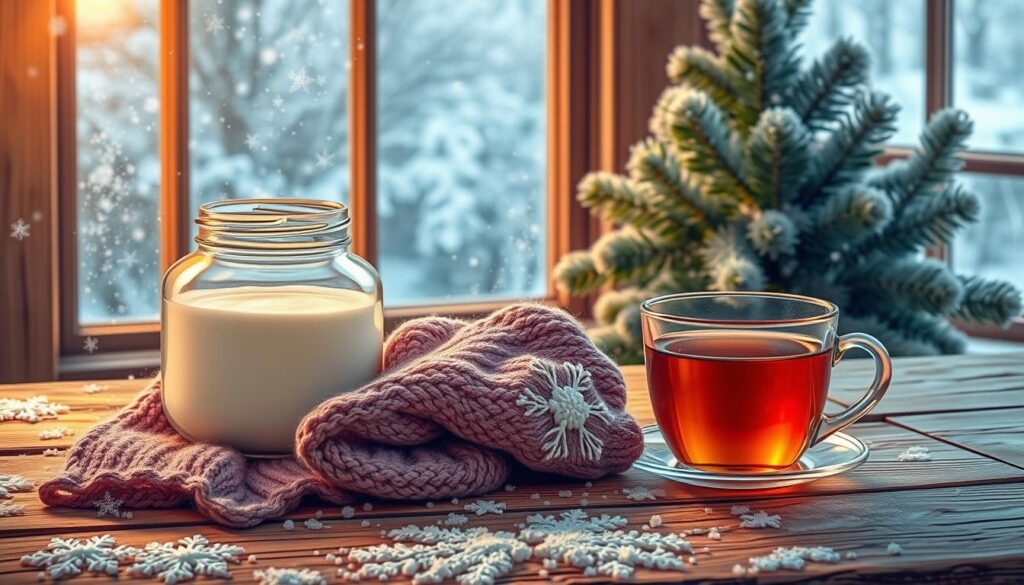Cold-Weather Habits That Are Secretly Ageing Your Skin
Did you know that almost 500 fires per year are caused by electric blankets that are more than 10 years old? This startling statistic highlights the hidden dangers that lurk in our everyday winter habits, many of which can have a significant impact on the health and youthfulness of our skin. As the temperatures drop and winter sets in, it’s crucial to be mindful of how our cold-weather routines and behaviors can gradually contribute to accelerated skin aging.
In this comprehensive guide, we’ll delve into the various ways in which common winter habits can secretly take a toll on your skin, and provide you with practical strategies to protect and nourish your complexion throughout the colder months. From understanding the science behind winter skin damage to identifying the hidden dangers of indoor heating, this article aims to empower you with the knowledge you need to maintain a youthful, glowing complexion, even in the harshest of winter conditions.
Key Takeaways
- Winter weather can significantly impact skin health, leading to accelerated aging.
- Understanding common habits that harm winter skin health is crucial for maintaining a youthful complexion.
- This article explores various factors affecting skin during cold months and provides strategies to protect and nourish your skin.
- Incorporating protective measures and adjusting your skincare routine can help combat the negative effects of winter on your skin.
- Staying informed and being proactive about your skin’s needs during the colder seasons can help you maintain a healthy, radiant glow year-round.
Understanding Winter’s Impact on Skin Health
As the cold, winter winds sweep in, they bring more than just a chill – they can have a significant impact on the health and appearance of our skin. From the outermost layer to the deeper dermal structures, the changing seasons can wreak havoc on our skin’s delicate balance.
How Cold Weather Affects Different Skin Layers
The harsh effects of winter weather can penetrate through the various layers of the skin. The dry skin and low humidity levels common during colder months can compromise the skin’s barrier function, leading to increased sensitivity, irritation, and even accelerated winter skin damage. Studies show that low temperatures can cause a 23% reduction in skin barrier recovery, while water loss through the skin can increase by up to 55%.
The Science Behind Winter Skin Damage
The science behind winter skin damage is complex, but it all boils down to the disruption of the skin’s natural balance. Cold temperatures, biting winds, and indoor heating systems can strip away the skin’s natural moisture, leaving it dry, cracked, and vulnerable. This disruption in the skin’s barrier function can lead to a cascade of issues, from inflammation to premature aging.
Seasonal Changes in Skin Barrier Function
As the seasons change, so too does the skin’s barrier function. During the winter, the skin’s ability to retain moisture and protect itself from environmental stressors can be significantly impaired. In fact, research shows that cold weather can lead to a 25% increase in water loss through the skin, while humidity levels can drop by up to 25%, further exacerbating the problem.
Hot Showers and Their Aging Effects
While a cozy, hot shower may seem like the perfect way to unwind on a chilly winter day, it can actually have detrimental effects on your skin’s health. The excessive exposure to hot water can strip your skin of its natural oils, leading to dryness, irritation, and accelerated aging. This is a crucial consideration for your winter skincare routine.
The high temperature of hot showers disrupts the skin’s delicate pH balance and compromises its protective barrier. This can result in a range of issues, including:
- Skin dehydration – The hot water evaporates the skin’s natural moisture, leaving it feeling tight and uncomfortable.
- Increased sensitivity – The loss of oils makes the skin more vulnerable to environmental stressors, leading to redness and irritation.
- Premature aging – The dehydration and compromised barrier function can contribute to the development of fine lines, wrinkles, and other signs of aging.
To maintain healthy, youthful-looking skin this winter, it’s essential to adjust your shower routine. Aim for lukewarm water instead of scorching hot, and limit your shower duration to 5-10 minutes. Incorporating a gentle, moisturizing body wash can also help replenish the skin’s natural oils and prevent dryness.
| Skin Condition | Impact of Hot Showers | Recommended Solution |
|---|---|---|
| Skin Dehydration | Hot water evaporates the skin’s natural moisture, leaving it feeling tight and uncomfortable. | Use lukewarm water and limit shower duration to 5-10 minutes. Incorporate a gentle, moisturizing body wash. |
| Increased Sensitivity | The loss of oils makes the skin more vulnerable to environmental stressors, leading to redness and irritation. | Adjust shower temperature and duration. Apply a nourishing moisturizer after showering to replenish skin’s natural oils. |
| Premature Aging | Dehydration and compromised barrier function can contribute to the development of fine lines, wrinkles, and other signs of aging. | Maintain a gentle, hydrating winter skincare routine to support skin’s health and resilience. |
By making a few simple adjustments to your shower habits, you can protect your skin from the aging effects of hot water and maintain a healthy, radiant complexion all winter long.
The Hidden Dangers of Indoor Heating
As the mercury drops outside, many of us turn to indoor heating systems to stay warm and comfortable. However, these sources of artificial heat can pose a hidden threat to your skin’s health. Over 80% of Americans rely on indoor heating during the winter months, unaware of the potential consequences it can have on their skin.
Impact on Skin Moisture Levels
The dry air generated by indoor heating systems can wreak havoc on your skin’s natural moisture levels. As the humidity indoors drops to lower levels during the colder seasons, your skin’s barrier function becomes compromised, leading to dryness, irritation, and even premature aging.
Optimal Home Humidity Settings
To combat the drying effects of indoor heating, experts recommend maintaining a relative humidity level of around 50% in your home. This optimal range helps to counteract the impact of artificial heat on your skin, keeping it hydrated and healthy throughout the winter.
Protective Measures Against Artificial Heat
- Invest in a humidifier to restore moisture to the air.
- Limit the duration of hot showers and baths, which can further strip away your skin’s natural oils.
- Incorporate nourishing, skin-replenishing products into your winter skincare routine.
- Stay hydrated by drinking plenty of water throughout the day.
By understanding the hidden dangers of indoor heating and taking proactive steps to protect your skin, you can maintain a healthy, youthful glow even in the chilliest of winters.

| Metric | Value |
|---|---|
| Americans using indoor heating in winter | Over 80% |
| Optimal indoor humidity level | Around 50% |
| Percentage of skin’s natural moisture lost due to indoor heating | Up to 30% |
Habits That Harm Winter Skin Health
As the temperatures drop and the air becomes drier, certain habits can unknowingly take a toll on your skin’s health during the winter months. Identifying and correcting these common skincare mistakes is crucial for maintaining a youthful, radiant complexion throughout the cold season.
One of the primary winter skincare mistakes is neglecting adequate moisturization. The dry, harsh conditions can strip your skin of its natural oils, leading to dryness, flakiness, and accelerated aging. Failing to replenish moisture can also compromise your skin’s protective barrier, making it more susceptible to environmental damage.
- Insufficient moisturizing can lead to dryness, flakiness, and premature aging of the skin.
- Neglecting to hydrate your skin can weaken its protective barrier, increasing vulnerability to external aggressors.
Another common blunder is the overuse of harsh, drying skincare products. While it may seem counterintuitive, using aggressive cleansers, toners, or exfoliants can disrupt the delicate balance of your skin, causing more harm than good. These products can strip away essential oils, leading to irritation, redness, and a compromised skin barrier.
| Winter Skincare Mistake | Potential Consequences |
|---|---|
| Inadequate moisturizing | Dryness, flakiness, accelerated aging |
| Using harsh, drying products | Irritation, redness, compromised skin barrier |
| Neglecting sun protection | Increased risk of sun damage, hyperpigmentation |
Lastly, it’s crucial not to neglect sun protection, even during the winter months. The sun’s UV rays can still penetrate through clouds and snow, leading to unwanted skin damage and premature aging. Failing to use a broad-spectrum sunscreen can result in hyperpigmentation, sunspots, and accelerated wrinkle formation.
By addressing these common winter skincare mistakes and implementing a thoughtful, gentle routine, you can help prevent skin damage and maintain a healthy, radiant complexion throughout the colder months.
Over-Exfoliation in Cold Weather
As the temperatures drop and the air becomes drier, it’s crucial to be mindful of your exfoliation routine. Overexfoliating during the winter can exacerbate skin sensitivity and lead to unwanted damage. By recognizing the signs of excessive exfoliation and adopting proper winter exfoliation methods, you can maintain your skin’s protective barrier and keep it healthy throughout the colder months.
Signs of Excessive Exfoliation
- Redness and irritation – Skin may appear inflamed, blotchy, or overly sensitive.
- Increased dryness and flakiness – The skin’s natural oils are stripped, leading to a compromised barrier.
- Breakouts and acne – Overexfoliation can disrupt the skin’s microbiome, causing blemishes.
- Tightness and discomfort – The skin may feel tight, itchy, or uncomfortable to the touch.
Proper Winter Exfoliation Methods
To maintain healthy, glowing skin during the winter, it’s essential to adjust your exfoliation routine. Opt for gentler, less-frequent exfoliation methods that are tailored to your skin’s needs. This could include:
- Using a soft, muslin cleansing cloth or a gentle, physical exfoliant once or twice a week, instead of daily.
- Incorporating chemical exfoliants with low concentrations of alpha-hydroxy acids (AHAs) or beta-hydroxy acids (BHAs) once or twice a week, depending on your skin’s tolerance.
- Avoiding harsh, drying scrubs and peels, which can further compromise the skin’s barrier during the winter.
Remember, the key to healthy, glowing skin in the colder months is to protect and nourish it. By being mindful of your exfoliation habits and adjusting them accordingly, you can maintain your skin’s optimal condition and prevent unwanted irritation or damage.
The Moisturizer Mistakes You’re Making
As the temperatures drop and the air becomes drier, maintaining healthy, hydrated skin during the winter months can be a real challenge. Unfortunately, many common moisturizer mistakes can lead to inadequate skin hydration, leaving your complexion feeling tight, flaky, and prematurely aged. To combat the effects of winter weather, it’s crucial to understand the importance of choosing the right moisturizer, applying it correctly, and adjusting your application frequency based on your skin’s unique needs.
One of the biggest moisturizer mistakes people make during the winter is using a formula that’s not heavy-duty enough to combat the drying effects of cold, harsh air. Winter moisturizer formulas that are richer, creamier, and more emollient are essential for providing the necessary dry skin relief your skin craves. Look for moisturizers containing hydrating ingredients like shea butter, ceramides, and hyaluronic acid to lock in moisture and strengthen the skin’s protective barrier.
Another common misstep is improper application. Many people make the mistake of only applying moisturizer to the face, neglecting the rest of the body. For a comprehensive skincare routine, be sure to moisturize your neck, chest, hands, and any other exposed areas to ensure your entire complexion stays nourished and hydrated.
| Moisturizer Mistake | Proper Technique |
|---|---|
| Using a lightweight moisturizer | Opt for a rich, creamy formula with emollient ingredients |
| Only moisturizing the face | Moisturize the entire body, including neck, chest, and hands |
| Applying moisturizer once a day | Moisturize morning and night, adjusting frequency as needed |
Finally, maintaining a consistent moisturizing routine is essential. While once-daily application may suffice during the warmer months, the drying effects of winter often require more frequent moisturizing, sometimes even twice a day. Pay attention to your skin’s needs and adjust your skincare routine accordingly to ensure your complexion stays soft, supple, and winter moisturizer-ready all season long.

Impact of Dehydration on Skin Aging
Maintaining proper skin hydration is crucial, especially during the winter months when the cold, dry air can strip moisture from the skin. Dehydration can accelerate the signs of skin aging, leading to wrinkles, fine lines, and a dull, lackluster complexion. Understanding the importance of skin hydration and implementing effective hydration strategies can help combat the aging effects of winter dehydration.
Water Intake Requirements in Winter
It’s a common misconception that people don’t need to drink as much water in the winter as they do in the warmer months. In reality, the body’s water needs remain high year-round. In fact, the dry winter air can actually increase the body’s water loss, making it crucial to stay hydrated. The recommended daily water intake for adults is generally 11.5 cups (2.7 liters) for women and 15.5 cups (3.7 liters) for men, and these guidelines apply equally to the winter season.
Hydration Strategies for Healthy Skin
- Drink water regularly throughout the day, even if you don’t feel thirsty.
- Incorporate water-rich foods like fruits and vegetables into your diet to boost internal hydration.
- Use a humidifier to add moisture to the air in your home and office, counteracting the drying effects of indoor heating.
- Apply a nourishing, skin-hydrating moisturizer morning and night to lock in moisture and prevent winter dehydration.
- Limit your intake of diuretic beverages like coffee, tea, and alcohol, as these can contribute to dehydration.
By addressing both internal and external hydration, you can maintain healthy, youthful-looking skin throughout the winter season and beyond. Prioritizing skin hydration is a key aspect of effective anti-aging skincare during the colder months.
Harsh Skincare Products to Avoid
During the winter months, your skin becomes more sensitive and vulnerable to the harsh effects of the cold weather. It’s crucial to be mindful of the skincare products you use to avoid exacerbating the problem. Steer clear of harsh, drying ingredients that can strip your skin of its natural oils and compromise its protective barrier.
One of the most common culprits is alcohol-based toners and astringents. These formulas can leave your skin feeling tight and uncomfortable, further exacerbating winter skin sensitivity. Instead, opt for gentle, hydrating cleansers and moisturizers that will nourish and soothe your complexion.
Similarly, aggressive exfoliating products can do more harm than good during the colder months. While regular exfoliation is essential for healthy skin, the combination of harsh scrubs and winter weather can lead to redness, irritation, and dryness. Stick to gentle, water-based exfoliants or use a soft, damp washcloth to slough off dead skin cells.
When it comes to product ingredients, avoid formulas with high concentrations of fragrances, sulfates, and other potentially irritating additives. Instead, look for gentle skincare products that are specifically formulated for sensitive skin types. Ingredients like ceramides, glycerin, and squalane can help strengthen the skin’s barrier and lock in much-needed moisture.
By being mindful of the products you use and prioritizing gentle skincare during the winter, you can protect your skin from the harsh effects of the cold weather and maintain a healthy, radiant complexion all season long.
Protecting Your Skin During Winter Activities
As the temperatures drop and winter sports and outdoor activities beckon, it’s crucial to prioritize skin protection. The harsh conditions of winter sports skincare and outdoor skin protection can take a toll on delicate skin, increasing the risk of damage. By understanding the specific challenges and implementing effective cold weather activities skincare strategies, you can maintain healthy, vibrant skin throughout the winter season.
Winter Sports and Skin Protection
Participating in winter sports like skiing, snowboarding, and ice skating exposes your skin to a unique set of environmental stressors. The combination of wind, cold, and sun’s glare can lead to dryness, redness, and even sunburns. To safeguard your skin, be sure to:
- Apply a broad-spectrum sunscreen with an SPF of 30 or higher, even on cloudy days.
- Wear protective gear like goggles, face masks, and gloves to shield your skin from harsh conditions.
- Moisturize regularly with a nourishing, fragrance-free cream or ointment.
Essential Outdoor Skincare Tips
Spending time outdoors in the winter, whether it’s hiking, walking, or simply commuting, can also have a significant impact on your skin’s health. To ensure your skin stays hydrated and protected, consider these essential tips:
- Invest in a moisturizing, wind-resistant lip balm to prevent chapped lips.
- Protect your hands with thick, insulating gloves or mittens to prevent dryness and cracking.
- Drink plenty of water to stay hydrated, as cold air can be dehydrating.
- Avoid taking long, hot showers, as they can strip your skin of its natural oils.
By incorporating these winter sports skincare, outdoor skin protection, and cold weather activities strategies into your routine, you can enjoy the winter wonderland while keeping your skin healthy and glowing.
Alcohol-Based Products and Skin Damage
As the winter chill sets in, it’s important to be mindful of the impact that alcohol-based skincare products can have on your skin’s health. While alcohol may seem like a quick fix for tackling oiliness or breakouts, it can actually lead to increased dryness and irritation – two common concerns during the cold weather months.
According to recent data, a staggering 69.3% of Americans reported consuming alcohol in some capacity in the past year, with 6.3% reporting heavy drinking habits. Interestingly, women appear to be more susceptible to the damaging effects, with 6.45% reporting heavy drinking compared to 6.1% of men.
The problem with alcohol-based products is that they can strip the skin of its natural oils, leading to a compromised skin barrier. This not only exacerbates dryness but also makes the skin more vulnerable to environmental stressors like harsh winds and bitter temperatures. To maintain a healthy, hydrated complexion throughout the winter, it’s crucial to opt for gentle, alcohol-free formulas and prioritize nourishing ingredients that support the skin’s natural moisture levels.







